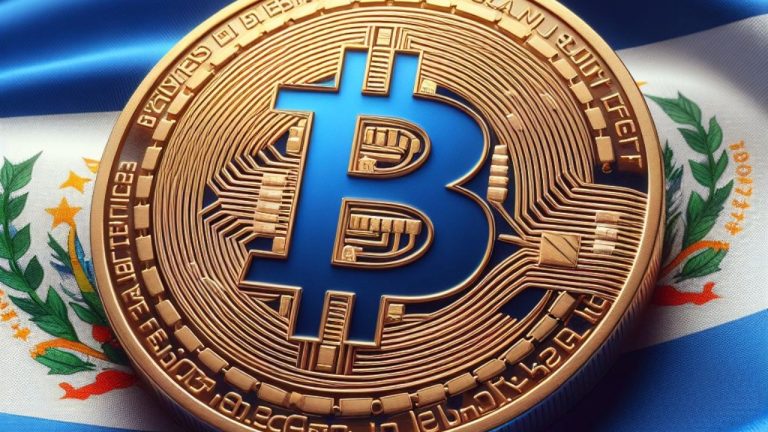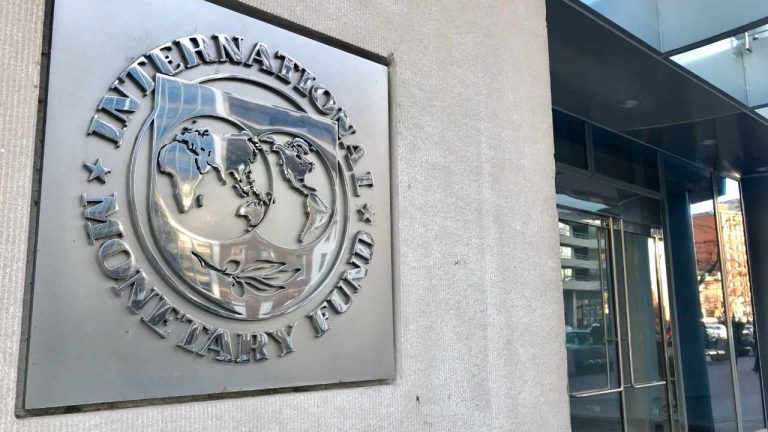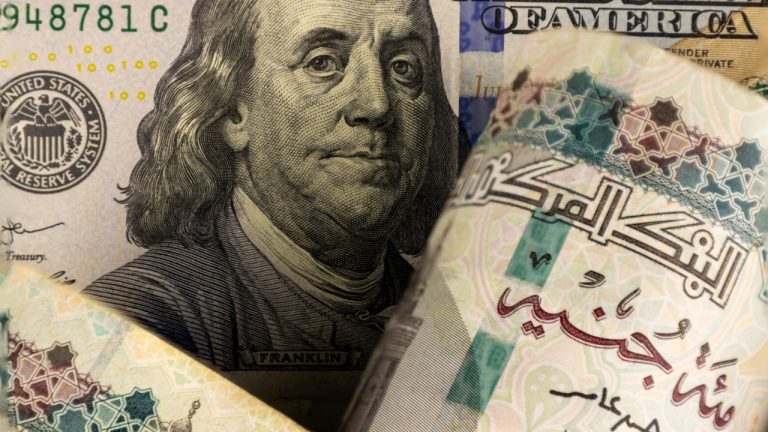Bitcoin's has been transforming traditional economic paradigms, and this transformation has opened it to both interest and scrutiny.
The post Bitcoin has transformed cross-border transactions, IMF study notes appeared first on Crypto Briefing.
 Welcome to Latam Insights, a compendium of Latin America’s most relevant crypto and economic news during the last week. In this issue: Bitcoin hinders El Salvador’s credit talks with the IMF, the Paraguayan Senate issues a statement supporting bitcoin miners, and Venezuela unveils a crypto-linked corruption scheme. Bitcoin Reportedly Hurts El Salvador Credit Opportunities With […]
Welcome to Latam Insights, a compendium of Latin America’s most relevant crypto and economic news during the last week. In this issue: Bitcoin hinders El Salvador’s credit talks with the IMF, the Paraguayan Senate issues a statement supporting bitcoin miners, and Venezuela unveils a crypto-linked corruption scheme. Bitcoin Reportedly Hurts El Salvador Credit Opportunities With […] Bitcoin and its adoption by the government of El Salvador have become a negative factor in the country’s negotiations with the IMF. According to reports, the institution demands changes to El Salvador’s Bitcoin law to receive a $1.4 billion credit line for expediting public debt payments and other obligations. El Salvador’s Bitcoin Allegiance Is Getting […]
Bitcoin and its adoption by the government of El Salvador have become a negative factor in the country’s negotiations with the IMF. According to reports, the institution demands changes to El Salvador’s Bitcoin law to receive a $1.4 billion credit line for expediting public debt payments and other obligations. El Salvador’s Bitcoin Allegiance Is Getting […] The International Monetary Fund (IMF) has urged Ukraine to finalize its crypto legislation, the country’s Deputy Minister of Digital Transformation for IT industry development has revealed. “In the face of war, we have to exploit the full range of opportunities and develop new sectors of the economy,” he stressed, adding that “Legalization of the crypto […]
The International Monetary Fund (IMF) has urged Ukraine to finalize its crypto legislation, the country’s Deputy Minister of Digital Transformation for IT industry development has revealed. “In the face of war, we have to exploit the full range of opportunities and develop new sectors of the economy,” he stressed, adding that “Legalization of the crypto […]
The International Monetary Fund (IMF) is reportedly recommending the Pakistan Federal Board of Revenue (FBR) expand the scope of their gains taxes to include crypto. According to a report from the Pakistani news outlet The News, the IMF is asking the FBR to bring crypto gains into the country’s tax net. The IMF is asking Pakistan’s […]
The post IMF Demands $3,000,000,000 Bailout Debt From Pakistan Through New Crypto Taxes: Report appeared first on The Daily Hodl.
 Authorities in Egypt recently allowed the local currency’s exchange rate versus the U.S. dollar to decrease by more than 60%. Additionally, the central bank raised interest rates by 600 basis points. Both steps were key conditions set by the IMF which Egypt had to meet before the approval of a new financial aid package. IMF […]
Authorities in Egypt recently allowed the local currency’s exchange rate versus the U.S. dollar to decrease by more than 60%. Additionally, the central bank raised interest rates by 600 basis points. Both steps were key conditions set by the IMF which Egypt had to meet before the approval of a new financial aid package. IMF […]
An International Monetary Fund (IMF) insider says a new reckoning in the US banking industry is “all too likely.” Desmond Lachman, former Deputy Director at the IMF’s Policy Development and Review Department, says he expects 2024 to be a rough year for American banks, the Chinese state-run Xinhua reports. Says Lachman, “It is all too […]
The post $359,320,000,000 Yanked Out of American Banks in One Year, New US Banking Crisis ‘All Too Likely’ in 2024: Ex-IMF Official appeared first on The Daily Hodl.

The election of new Argentine President Javier Milei has given many in the local Bitcoin community cause for hope.
After a long and dramatic presidential race, libertarian candidate Javier Milei triumphed in Argentina’s presidential election on Nov. 19.
Milei promises to abolish the country’s central bank, among a slew of other radical policy changes capturing the attention and imagination of the crypto community.
With 99% of the vote counted on Sunday, Nov. 19, Milei was declared the winner. The flamboyant politician secured the favor of 55% of the electorate, with three million more ballots to his name than rival Sergio Massa.
Fernando Nikolić, an Argentine Bitcoin (BTC) advocate and founder of media analyst firm Bitcoin Perception, told Cointelegraph that Milei “has spoken positively about Bitcoin when asked about it in interviews,” but also pointed out that enthusiasm should be tempered by the fact that “passing any sort of law that is considered ‘Bitcoin-friendly’ is not a part of his official program.”
Nikolić added that as an advocate for free market money, Milei is also unlikely to pass any laws that would harm Bitcoin.
Iván Paz, the CEO of crypto trading platform Trading Different, took a positive view of the election results. According to Paz, Milei’s free market policy agenda is likely to reinvigorate Argentina’s flagging economy.
“Argentina will enter a cycle of accelerated economic recovery, driven by the confidence of local and foreign investors,” Paz told Cointelegraph. “The reduction of the tax burden and the legal guarantee will once again make Argentina an attractive country to project in the long term.”
Many Argentinians now look forward to sweeping reforms. Camilo Jorajuría de León, vice-president of Bitcoin Argentina, reminded the incoming president to keep his electoral promises:
“Bitcoin is for monetary freedom, and that was precisely one of the proposals of the president-elect. As Bitcoiners, we hope he fulfills his promise.”
Milei’s first task in office will be taming the nation’s runaway inflation, which hit 143% in October. For comparison, United States inflation peaked at 9.1% in June 2022 and is now 3.2%. With the spending power of the Argentine peso in freefall, it’s little wonder that Argentinians voted for the candidate proposing to cut almost all public expenditure and big government.
Milei promises to reinvent and reinvigorate Argentina’s economy with a completely new approach. The beliefs that underpin the policy agenda of the libertarian anarcho-capitalist are likely to resonate with many in the crypto community.
His headline policies include “blowing up” the central bank to prevent money printing, ditching the peso in favor of the U.S. dollar and scrapping almost every form of welfare in the country.
Recent: Can blockchain supply the guardrails to keep AI on course?
The president-elect confirmed his future plan for government departments in a dramatic video circulating on social media.
“Ministry of Sports and Tourism — out!” said Milei. “Ministry of Culture — out! Ministry of the Environment and Sustainable Development — out!”
In the video, Milei punctuates every cut by tearing the name of the department off a whiteboard and tossing it aside.
Argentina's new president and Donald Trump fan Javier Milei has promised to radically change the country. Could he succeed? Read more https://t.co/nU9XYLTqBN pic.twitter.com/Z8gYllY4JV
— TalkTV (@TalkTV) November 22, 2023
While President-elect Milei may embody a maverick spirit that appeals to Bitcoiners and the ideological proclivities of the cryptosphere, that is not the same thing as actively supporting it.
The president-elect previously outlined why Bitcoin is useful as a monetary instrument free from state control. In a video posted to Reddit’s r/bitcoin 11 months ago, Milei states his position.
“What is the point? The point is that the first thing we have to understand is that the central bank is a scam,” said Milei. “It is a mechanism by which politicians cheat the good people with inflationary tax. What Bitcoin is representing is the return of money to its original creator — the private sector.” Milei adds:
“Bitcoin is the natural reaction against central banker scammers and to make the money private again.”
The new president may praise Bitcoin as a financial instrument, but that is somewhat different from what Bitcoin advocates may wish for. Undoubtedly, there are those who hope Argentina will adopt Bitcoin as legal tender.
Cointelegraph asked Nikolić what the election of Milei means for cryptocurrency advocates.
“I don’t believe this will drastically alter the current landscape,” Nikolić said. “Argentinians have been embracing Bitcoin and other cryptocurrencies for many years. My hope is that, in the long term, Argentina becomes more entrepreneur-friendly, prosperous and free, helping to mend the significant cracks in the country’s foundational structure.”
Nikolić added that the “widespread adoption of Bitcoin across the nation may be slow if 50% of its citizens live below the poverty line and lack an understanding of savings concepts.”
That’s not something that can change overnight. Milei’s policy broader economic policies will need time to bed in.
As for the million-dollar question: “Will Bitcoin become legal tender in Argentina?” Nikolić suggests that legal tender certification may be marginally less important than it seems.
“I’m of the view that adoption is more robust when it emerges organically from the grassroots rather than being imposed top down. I’m hopeful that Bitcoin adoption in Argentina will continue to flourish, especially as the country progresses under Milei’s leadership and its people begin to experience improved living conditions.”
Soaring inflation is not the only problem facing Milei in government. When the president-elect takes office on Dec. 10, he will take the reigns of a country facing a laundry list of economic challenges.
Chief among them is the fact that Argentina is the International Monetary Fund’s (IMF) biggest borrower. The country owes the IMF a massive $31 billion.
The body gave the president a nod and a wink as early as Monday. Kristalina Georgieva, managing director of the IMF, was among those congratulating Milei on his electoral success.
“We look forward to working closely with him,” she added.
Congratulations to President-elect Javier Milei @JMilei. We look forward to working closely with him and his administration in the period ahead to develop and implement a strong plan to safeguard macroeconomic stability and strengthen inclusive growth for all Argentinians.
— Kristalina Georgieva (@KGeorgieva) November 20, 2023
Economist Nicolás Litvinoff believes Milei will need to get the IMF monkey off his back as a matter of first priority.
“I think the most important thing is to regain autonomy in terms of monetary policy. On the one hand, to accumulate reserves in the central bank that are practically non-existent now,” said Litvinoff before adding that Milei must “restore the purchasing power of wages to reactivate consumption and the economy[…] but for that, you need the International Monetary Fund out of the way.”
Milei first came to prominence as an economist, author and political commentator.
Western media outlets compare Milei to former U.S. President Donald Trump, but the similarities drawn are often shallow. Both men are populists from outside the political mainstream. Both men rode a wave of public disaffection to electoral success. Both men have unconventional hair.
Such comparisons are just as likely to obfuscate as enlighten.
Milei was born in 1970 in Argentina’s capital Buenos Aires. He was raised as a Catholic, which informs his politics to this day. While Milei is mostly socially liberal, he is opposed to both abortion and euthanasia. He supports freedom of choice on drugs, guns, prostitution and same-sex marriage.
In his youth, Milei sang in a Rolling Stones cover band. His presentation style owes much more to the rock world than to the political.
During the campaign, Milei the showman brought a chainsaw to his rallies, frequently revving it up and raising it triumphantly above his head.
Recent: Former Coinbase exec posits blockchain-driven vision of future societies
For supporters, Milei’s chainsaw was a metaphor for the drastic cuts his administration would take to curb government spending and reign in inflation. For opponents, the chainsaw represented something else: a dangerous and cavalier individual waving around a chainsaw in public.
They dubbed him “El loco” — the crazy one — or madman. That was little matter. Milei’s message and style resonated with voters sick of the status quo, no matter how crazy he seemed to the doubters.
As for his rival Sergio Massa, the chainsaw took on a final, more ominous meaning as Milei cut him down this weekend in a very public chainsaw massacre. Now that Milei has the keys to the president’s office, the clean-up of Argentina’s broken system must begin.

International Monetary Fund managing director Kristalina Georgieva urged the public sector to “keep preparing to deploy” central bank digital currencies.
During her opening speech at the Singapore FinTech Festival, International Monetary Fund (IMF) managing director Kristalina Georgieva urged the public sector to “keep preparing to deploy” central bank digital currencies (CBDCs) and related payment platforms in the future.
Georgieva expressed her optimism about the implementation of CBDCs worldwide but said, “We have not yet reached the land,” and there is still much uncertainty:
“Adoption of CBDCs is nowhere close. But about 60 percent of countries are exploring them in some form today.”
Georgieva believes CBDCs can replace cash, offer resilience in advanced economies and improve financial inclusion in underbanked communities. According to Georgieva, CBDCs can co-exist with “private money,” being its “safe and low-cost alternative.”
Related: IMF director urges ‘financial inclusion’ via digitalization
Georgieva also highlighted the importance of technological infrastructure in CBDC projects, personal data protection and even the possible role of artificial intelligence (AI) in enhancing the national digital currencies. She put a particular emphasis on cross-border payment support:
“To the extent CBDCs are deployed, they must be built to facilitate cross-border payments, which are at present expensive, slow, and available to few. Again, we must start this work today so we don’t have to backpedal tomorrow.”
The IMF head presented its CBDC virtual handbook and marked the Bank for International Settlements (BIS) role in the public sector’s digital money experiments.
The IMF has recently been active in its analysis of necessary crypto regulations. On Sept. 29, it proposed a crypto-risk assessment matrix (C-RAM) for countries to spot indicators and triggers of potential risks in the sector.
The IMF’s Synthesis paper — jointly prepared with the Bank for International Settlements (BIS) — was unanimously adopted by the “G20 Finance Ministers and Central Bank Governors Communique” in October.
Magazine: I spent a week working in VR. It was mostly terrible, however…

IMF managing director Kristalina Georgieva says digitalization is “the most important way” to scale up financial inclusion.
During her opening speech at the International Monetary Fund’s (IMF) seminar on financial inclusion in Marrakesh, Morocco, IMF Managing Director Kristalina Georgieva said digitalization is “the most important way” to scale up financial inclusion.
“It is digital that moves help to people, investment and ability of the economy to accelerate,” Georgieva said, citing digital cash transfers in the African nation of Togo put in place during the COVID-19 pandemic. She urged for comprehensive national strategies for financial inclusion but reminded the audience about the financial stability risks, which often correlate with digitalization.
Related: Retail CBDCs bring unknown ‘consequences’ to financial system — IMF director
The IMF has recently been active in its analysis of necessary crypto regulations. On Sept. 29, it proposed a crypto-risk assessment matrix (C-RAM) for countries to spot indicators and triggers of potential risks in the sector.
The IMF’s Synthesis paper — jointly prepared with the Bank for International Settlements (BIS) — was unanimously adopted by the “G20 Finance Ministers and Central Bank Governors Communique” in October.
The paper advocates for comprehensive oversight of crypto instead of a blanket ban. Its high-level recommendations include cross-border cooperation and information sharing between regulators, a demand for comprehensive governance and risk management frameworks for crypto companies, and a guarantee of access to relevant data provided by companies to the authorities.
Magazine: Beyond crypto. Zero-knowledge proofs show potential from voting to finance